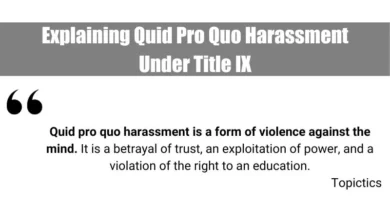There’s No Quid Pro Quo If There’s No Quo: Know How
The phrase “there’s no quid pro quo if there’s no quo” underscores the fundamental principle of reciprocal exchange inherent in a quid pro quo arrangement. In Latin, “quid pro quo” means “something for something,” highlighting the necessity for both parties to contribute and receive something of value.
The “quid” represents the initial offering or action, while the “quo” is the expected return or benefit. If the “quo” is absent, the reciprocal nature of the agreement collapses, rendering it invalid or incomplete. This principle is critical in various contexts, such as legal contracts, business transactions, and political negotiations, ensuring that all parties uphold their end of the bargain to maintain fairness and mutual benefit.
| Aspect | Details |
|---|---|
| Definition | The phrase means that a reciprocal exchange (quid pro quo) cannot exist without both parties fulfilling their part. |
| “Quid” | Refers to the initial offering or action provided by one party. |
| “Quo” | Refers to the expected return or benefit the other party provides. |
| Importance of Reciprocity | Both “quid” and “quo” are essential for a valid exchange; the absence of either element invalidates the arrangement. |
| Legal Context | Contracts and agreements require clear reciprocation to be enforceable; lacking a “quo” can nullify the deal. |
| Business Application | Business transactions depend on mutual benefits; without the return action, the exchange fails. |
| Political Implications | In politics, deals often hinge on reciprocity; failure to deliver the “quo” can lead to disputes or accusations. |
| Misconceptions | Misunderstanding the phrase as any exchange without recognizing the need for both parties’ contributions. |
| Real-World Example | A supplier delivers goods (quid) expecting payment (quo); the transaction is incomplete without payment. |
| Significance | Highlights the necessity for clear, mutual agreements in various fields to avoid misunderstandings and disputes. |
Let’s explore the topic deeply:
Introduction

The phrase “there’s no quid pro quo if there’s no quo” emphasizes the necessity of a reciprocal exchange for a quid pro quo arrangement to exist. Understanding this phrase is crucial in various contexts, such as legal, business, and political realms. This article thoroughly explores the phrase, breaking it down, applying it to different scenarios, and highlighting its importance and relevance.
Breaking Down the Phrase
Understanding “Quid”
“Quid” originates from Latin, meaning “something.” In the context of quid pro quo, it refers to the initial offering or action given with the expectation of receiving something in return.
Understanding “Quo”
“Quo,” also from Latin, means “something for something.” It is the expected return or benefit in a quid pro quo arrangement. Without the “quo,” there is no reciprocal exchange.
The Interdependence of Quid and Quo

For a quid pro quo to be valid, both elements must exist. The “quid” represents the offer, while the “quo” signifies the expected return. The absence of either negates the arrangement. Thus, “there’s no quid pro quo if there’s no quo” underscores the fundamental reciprocity requirement in such exchanges.
Applications of the Phrase
Legal Context
Quid pro quo arrangements are often scrutinized in legal terms to ensure fairness and legality. Contracts and agreements rely on clear reciprocation between parties. The agreement may be deemed invalid or unenforceable without a return benefit or action.
Business and Contracts
In business, quid pro quo forms the basis of many transactions. Companies enter into agreements expecting mutual benefits. For instance, a supplier provides goods with the expectation of payment. If the payment (quo) is absent, the transaction (quid pro quo) fails.
Politics and Diplomacy
In politics, quid pro quo can be controversial. Politicians and diplomats may negotiate deals expecting something in return. The absence of the return action or benefit can lead to disputes or accusations of bad faith.

Examples
Hypothetical Scenarios
- Employment: An employer offers a promotion (quid) in exchange for increased productivity (quo). The promotion offer may be withdrawn if the employee fails to deliver productivity.
- Service Agreements: A company provides a service (quid) expecting timely payment (quo). If the payment is delayed or missing, the service provision may cease.
Real-World Applications
- International Relations: A country may provide aid (quid), expecting political support (quo) in return. If the support is not provided, future aid may be reconsidered.
- Corporate Deals: In mergers and acquisitions, companies may agree to share resources (quid) with the expectation of combined market benefits (quo). Failure to achieve these benefits can unravel the deal.
Common Misconceptions
Misinterpretations of the Phrase
One common misconception is that any transaction can be labeled as quid pro quo without the necessity of a reciprocal return. This is incorrect. The essence of quid pro quo lies in the mutual exchange. Without both parties benefiting, the term does not apply.
Distinguishing from Similar Phrases
Quid pro quo is often confused with similar phrases like “tit for tat” or “give and take.” While these phrases also imply reciprocity, quid pro quo specifically refers to formal or transactional exchanges with clear expectations from both sides.
Conclusion

Understanding the phrase “there’s no quid pro quo if there’s no quo” is vital across various fields. It highlights the essential nature of reciprocal exchange in transactions and agreements.
By breaking down the components and applying the concept to real-world scenarios, we can appreciate the importance of ensuring both sides fulfill their obligations.
This clarity helps prevent misunderstandings and disputes, ensuring all parties are aware of and committed to their roles in any quid pro quo arrangement.
FAQ
What distinguishes quid pro quo from a simple favor?
Quid pro quo differs from a simple favor in that it involves a clear, agreed-upon exchange between two parties. In a quid pro quo arrangement, both parties expect something of value in return for what they provide. For example, if a friend helps you move, expecting nothing in return, it is a favor. However, if they help you move with the understanding that you will help them with a project in return, it becomes a quid pro quo. The mutual expectation of exchange defines quid pro quo, whereas a favor is typically one-sided and given without the expectation of reciprocity.
How can businesses ensure their contracts are free from ambiguous quid pro quo arrangements?
Businesses should ensure that all contracts and agreements are explicitly detailed to avoid ambiguity in quid pro quo arrangements. Each party’s obligations and expected returns should be clearly outlined in writing. This includes:
- Specific deliverables or services provided (quid)
- Clear terms of what is expected in return (quo)
- Deadlines and timelines for the exchange
- Legal repercussions or consequences if either party fails to fulfill their part of the agreement
By documenting these details, businesses can prevent misunderstandings and ensure that all parties mutually understand the agreement’s terms.
Can quid pro quo arrangements be considered unethical or illegal?
Quid pro quo arrangements are not inherently unethical or illegal; their legality and ethical nature depend on the context and the terms involved. Quid pro quo is a standard and acceptable practice in many business and legal contexts. However, when such arrangements involve elements like coercion, bribery, or exploitation, they can become unethical and illegal. For instance:
- In the workplace, quid pro quo harassment occurs when job benefits are conditioned on sexual favors, which is illegal.
- In politics, exchanging favors for political support or influence can lead to corruption charges.
Therefore, the fairness, transparency, and voluntariness of the exchange determine the ethical and legal status of a quid pro quo arrangement.
What role does quid pro quo play in diplomatic negotiations?
Quid pro quo is a common strategy used in diplomatic negotiations to achieve mutually beneficial agreements between countries. Diplomatic quid pro quo involves one country offering concessions, aid, or support in exchange for similar benefits from another country. This can include:
- Trade agreements where one country reduces tariffs in exchange for similar concessions
- Military alliances where one country provides defense support in exchange for strategic bases
- Humanitarian aid is provided with the expectation of political or economic support
Diplomatic quid pro quo helps countries achieve their foreign policy goals while ensuring both parties gain from the agreement. However, these arrangements must be carefully negotiated to maintain balance and fairness, avoiding perceptions of coercion or exploitation.









